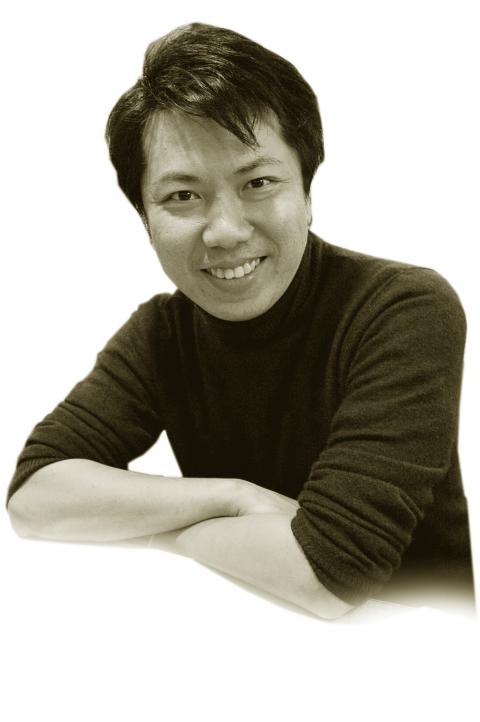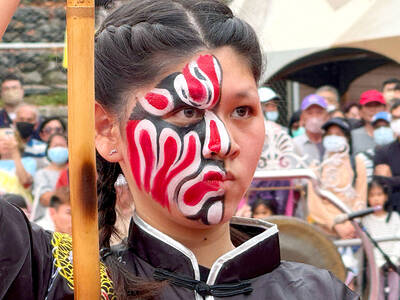This year, Keng Yi-wei (耿一偉) enters his second of a three-year assignment as the artistic director of the Taipei Arts Festival (台北藝術節, TAF). A part-time assistant professor at the Department of Theater Arts, Taipei National University of the Arts (國立台北藝術大學), Keng has spent many years traveling the world watching theater, and has engaged in a wide range of theatrical forms, from children’s theater, through experimental theater to theater for the disabled. In a telephone interview with the Taipei Times, Keng spoke about his new role as an arts festival administrator.
Keng didn’t start out in the theater. He majored in philosophy at National Taiwan University (台灣大學), and then traveled to Prague, where a series of accidents saw a detour in his academic plans into the realm of music and theater. He returned to Taiwan in 1999, and has since been particularly associated with the Guling Street Avant-garde Theater (牯嶺街小劇場).
“I have been involved with many different aspects of theater,” Keng said, “and this is an advantage for a festival director. A broad network is important for this job, and because I have been involved in so many areas, my network is pretty good.”

Photo courtesy of TAF
While this network, and his wide-ranging experience, has proved invaluable, Keng said that there was still much to learn in his current position. Last year, his first as TAF artistic director, he sought to provide theater with a broader audience base by focusing on comedies, which he believed would have greater popular appeal than more serious theater.
“Last year was my first as an artistic director. I wanted more people to know about this arts festival … I chose material that tended toward comedy, as a way of bringing in new audiences. But actually it didn’t make much difference to our ticket sales. I had an insight: if you make a play about laborers, laborers will not necessarily come and see it. A play about doctors will not necessarily attract doctors. Whatever the material, the people coming to the theater are usually the same … Last year I thought that the content of the shows would impact on ticket sales. Now I realize that is not the case, I feel less constrained. My job is to pick shows because I think they are interesting enough and will make up a diverse and exciting program. Ticket sales can be left to the marketing side of the operation.”
Keng has brought in a diverse range of productions for this year’s festival, but more importantly, he has followed on from an initiative begun last year of encouraging collaborations between local and foreign artists.
“Firstly, because these are co-creations, this necessarily means that what emerges is a new production. And the festival needs new productions. Secondly, it is a question of networking. If foreign artists come here to work, they will get to know local theater groups, and this relationship will grow. If it were not for the platform of this festival, most local theater groups would not have the experience to collaborate with foreign groups. This kind of stimulus is important, because our perspective [in Taiwan] can easily become too narrow. The best way to provide stimulus is by bringing people together … It can establish international relations [between artists] that will lay the groundwork for other collaborations in future.”
Overcoming obstacles
Keng sees such international collaboration as key to the growth of Taiwan’s arts scene, which faces many kinds of constraints. The need to look outward at a creative level is imperative, and he believes that the current government policy of subsidizing “fixed title theater” (定目劇), an attempt to build a theater environment like London’s West End or New York’s Broadway, is mistaken.
“This model is not suited to Taipei,” he said. “It is a phenomenon that has developed out of specific circumstances. Moreover, we must recognize that theater culture is not highly developed in Taiwan … What they are trying to do is similar to creating a Taiwan-style night market in the middle of New York … One fried chicken stall does not make a night market.”
cooperation key
Keng sees the development of Taiwan’s theater in quite different terms. “We have many highly talented artists,” he said. “Taiwan’s theater companies have many good qualities, and have great appeal to foreigners. We are also very energetic. Cooperation is a great way to develop,” Keng said, suggesting that this kind of effort can redress some of the imbalances in Taiwan’s theater environment. “This year we already have an agreement with the Shanghai Arts Festival, and for next year I want to organize some co-productions with European arts festivals, so we can have productions performed outside Taiwan.”
“To work in the theater you need great passion,” Keng said. “It is not like some other industries which can grow very quickly. You can’t think too much (about the future), you simply have to be happy to be involved … Taiwan has an audience that will support theater. The government has designated quite a lot of money to the arts, but it shouldn’t simply be there as a subsidy. It would be better used to influence the direction of development. … Arts and theater need to be rooted more firmly in society. This is the 15th TAF, but many people don’t even know that this event exists. I have plenty of room in which to make things better.”
Keng remains optimistically philosophical about the arts, and believes that his background in philosophy plays a part in what he does. “After all, philosophers like Jean-Jacques Rousseau and Denis Diderot wrote plays,” he said, emphasizing that the worlds of philosophy and theater are complementary ones. But he is drawn to the larger stage provided by the theater. “As a (university) philosophy teacher, how many students can you teach at one time?” he said. “As a theater director, you can communicate with many more people.”

The People’s Republic of China (PRC) last week offered us a glimpse of the violence it plans against Taiwan, with two days of blockade drills conducted around the nation and live-fire exercises not far away in the East China Sea. The PRC said it had practiced hitting “simulated targets of key ports and energy facilities.” Taiwan confirmed on Thursday that PRC Coast Guard ships were directed by the its Eastern Theater Command, meaning that they are assumed to be military assets in a confrontation. Because of this, the number of assets available to the PRC navy is far, far bigger

The 1990s were a turbulent time for the Chinese Nationalist Party’s (KMT) patronage factions. For a look at how they formed, check out the March 2 “Deep Dives.” In the boom years of the 1980s and 1990s the factions amassed fortunes from corruption, access to the levers of local government and prime access to property. They also moved into industries like construction and the gravel business, devastating river ecosystems while the governments they controlled looked the other way. By this period, the factions had largely carved out geographical feifdoms in the local jurisdictions the national KMT restrained them to. For example,

The remains of this Japanese-era trail designed to protect the camphor industry make for a scenic day-hike, a fascinating overnight hike or a challenging multi-day adventure Maolin District (茂林) in Kaohsiung is well known for beautiful roadside scenery, waterfalls, the annual butterfly migration and indigenous culture. A lesser known but worthwhile destination here lies along the very top of the valley: the Liugui Security Path (六龜警備道). This relic of the Japanese era once isolated the Maolin valley from the outside world but now serves to draw tourists in. The path originally ran for about 50km, but not all of this trail is still easily walkable. The nicest section for a simple day hike is the heavily trafficked southern section above Maolin and Wanshan (萬山) villages. Remains of

Shunxian Temple (順賢宮) is luxurious. Massive, exquisitely ornamented, in pristine condition and yet varnished by the passing of time. General manager Huang Wen-jeng (黃文正) points to a ceiling in a little anteroom: a splendid painting of a tiger stares at us from above. Wherever you walk, his eyes seem riveted on you. “When you pray or when you tribute money, he is still there, looking at you,” he says. But the tiger isn’t threatening — indeed, it’s there to protect locals. Not that they may need it because Neimen District (內門) in Kaohsiung has a martial tradition dating back centuries. On